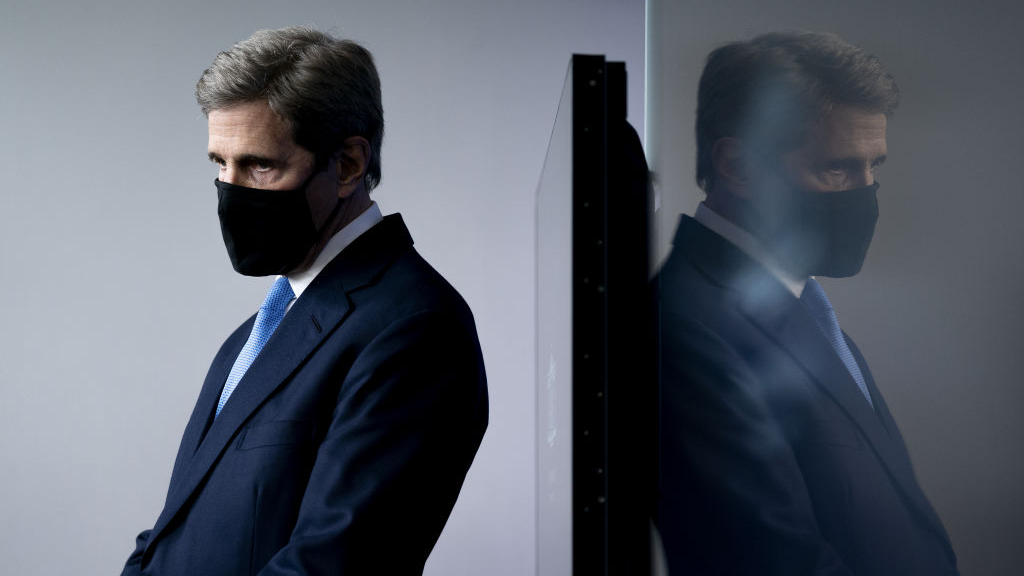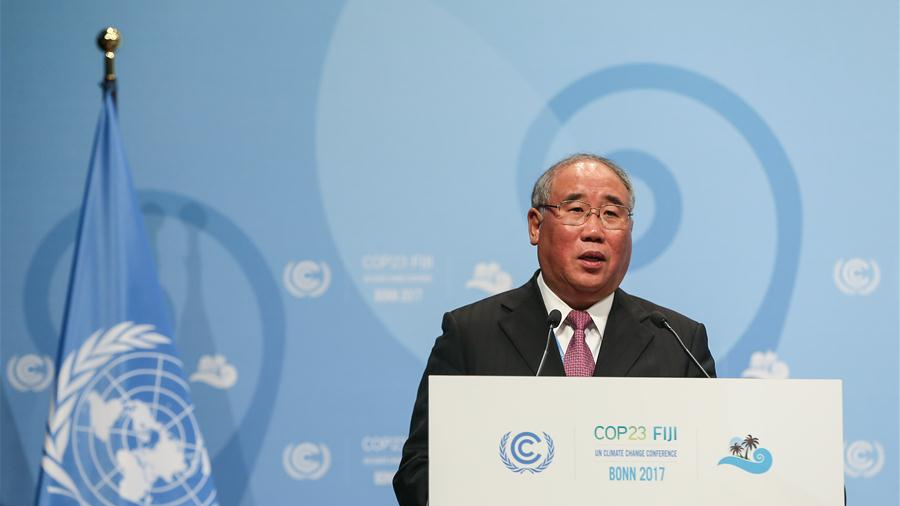
John Kerry, the U.S. special presidential envoy for climate, wears a protective mask during a news conference in the James S. Brady Press Briefing Room at the White House in Washington, D.C., January 27, 2021. /Getty
John Kerry, the U.S. special presidential envoy for climate, wears a protective mask during a news conference in the James S. Brady Press Briefing Room at the White House in Washington, D.C., January 27, 2021. /Getty
Editor's note: Bradley Blankenship is a Prague-based American journalist, political analyst and freelance reporter. The article reflects the author's opinions and not necessarily the views of CGTN.
On the eve of the Lunar New Year, U.S. President Joe Biden and Chinese President Xi Jinping finally held their first phone conversation since the former was sworn into office. Confrontation over matters pertaining to China's domestic affairs appeared to be a priority for Biden, unfortunately, but he did indicate that climate was at least one area of cooperation.
This posturing has led many analysts to question the administration's path on this issue moving forward. After all, as many in Washington are asking, how is it possible to implement "extreme competition" with China while also looking for ways to cooperate on this extremely important issue?
Well, so far it looks like the new administration would like to keep climate a non-political issue. President Biden's special climate envoy John Kerry indicated during a press conference several weeks ago on January 27 that Washington would not falter on its differences with Beijing in the name of fighting climate change.
"Those issues will never be traded for anything that has to do with climate. That's not going to happen. But climate is a critical, standalone issue," Kerry said.
Speaking about his Chinese counterpart, Xie Zhenhua, also a key architect of the Paris Agreement who later returned as China's special envoy for climate affairs, Kerry called him a "leader" and a "capable advocate" for his country, according to a Reuters report. Kerry and Xie have reportedly cooperated for about 20 years and know each other quite well.
For his part, Xie led the Chinese delegation in global climate negotiations from 2007 to 2018 and was recently selected again as China's special climate envoy. He was pivotal to the 2014 U.S.-China Joint Announcement on Climate Change that was seen as a first step in forging the Paris climate agreement.

China's special representative on climate change affairs Xie Zhenhua delivers a speech during a high-level meeting of UN climate talks in Bonn, Germany, November 16, 2017. /Xinhua
China's special representative on climate change affairs Xie Zhenhua delivers a speech during a high-level meeting of UN climate talks in Bonn, Germany, November 16, 2017. /Xinhua
Both China and the U.S. understand the need to keep the pressing issue of climate change – an issue of global concern that is already threatening organized human life – out of the political sphere. Together, both countries account for more than 40 percent of global greenhouse gas emissions, meaning that cooperation between the two is essentially a prerequisite for serious global climate action.
It appears that U.S. voters also understand how important this is. According to an early February poll by the Asia Society Policy Institute and Data for Progress, 56 percent of respondents supported America's cooperation with China on climate change, more important than all other issues – including COVID-19 – except for nuclear disarmament.
However, public opinion in the U.S. has notably shifted in favor of a policy approach, one often heard by Biden himself, that the U.S. should hold China "accountable" for its climate ambitions, including the country's historic announcement to achieve net zero greenhouse gas emissions by 2060.
The reason for this can be seen in speeches given by Biden's top officials and even some of the former Trump administration, who hold China to double standards and make the prospect of depoliticizing climate change even more difficult.
For example, they often accurately point out that China produces almost 30 percent of the world's carbon emissions while the U.S. produces about 15 percent, forgetting to note that China's population is about four times larger. On a per capita basis, the U.S. is among the highest producers of greenhouse gases in the world and is not on a path to carbon neutrality like China or even the EU.
Such things, as inconspicuous as they may appear in Washington, have disastrous effects in the real world. Biden is inadvertently providing ammunition to his political opponents that routinely downplay or deny the existence of climate change to begin with and also want to damage China-U.S. ties further by giving even one inch of ground to false narratives.
There's no need to point fingers; the COVID-19 pandemic has shown that those who are too busy looking for someone to blame instead of solving pressing issues end up suffering the most in the end.
Instead, the U.S. needs to get to the table to make serious headway on climate change after the country's withdrawal from the Paris climate agreement and four years of reckless environmental policy at home. Without this, any aggressive approach to hold anyone accountable, especially China, would be the very definition of "leading from behind."
(If you want to contribute and have specific expertise, please contact us at opinions@cgtn.com.)

